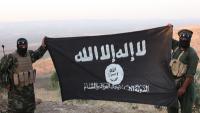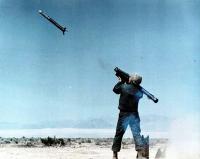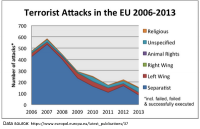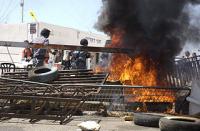-
Ryan examining congressional authorization of war against ISIS

House Speaker Paul Ryan (R-Wisconsin) has instructed the House majority leader and the chairman of the House Foreign Affairs Committee to begin discussions with House members about whether a measure which would authorize war against ISIS would be likely to be supported by a majority of House members. Senate majority leader Mitch McConnell (R-Kentucky), and many other Republicans in Congress, question the need for such a measure.
-
-
Adelson offered to pay for Iron Dome’s development

In 2013, shortly after Congress had passed a funding bill for the joint Pentagon-Israel Iron Dome missile defense system, Senator Harry Reid (D-Nevada), then the Senate’s majority leader, received a call from one of his constituents, the gambling billionaire Sheldon Adelson. Adelson asked Reid to convey to the White House a most unusual offer: He, Adelson, was willing personally to contribute $1 billion of his own money toward the development costs of Iron Dome.
-
-
It’s too late for a two-state solution in Israel-Palestine

Many obstacles stand in the way of a two-state solution to the conflict in Israel and Palestine. The current wave of violence has cemented additional layers of distrust of Palestinians to the ones Jewish Israelis already harbor. The hatred is calcifying. Reaching a two-state solution is essential: Within a few years there will be more Palestinians than Jews “between the River and the Sea,” and without a Palestinian state, Israel will either have to give the right to vote to Palestinians or become an apartheid state like South Africa once was. Demographic changes taking place within Israel’s Jewish population, however, may make the implementation of a two-state solution, if it is miraculously agreed to by the two sides, impossible to implement. The most important structural change is that Israel is steadily becoming more religious, which is leading to a decline in the overall level of education and economic productivity of the Israeli population. Allied to the increasing propensity to religiosity among Israeli Jews are trends in the composition of the Israel Defense Forces (IDF), a change that raises questions about the reliability of the army. The IDF is increasingly a religious army, recruited from the settler community in the West Bank. Best estimates are that if a two-state agreement is somehow reached, about 100,000 settlers would have to be evacuated from the West Bank under any such agreement. Could the IDF be relied upon to evacuate Jerusalem and West Bank settlements — as they did in Gaza in 2005 — with battalion commanders who are increasingly religious, and with religious soldiers who, in any event, are more likely to obey their rabbis’ instructions than their commanders’ orders? With every passing year, using the IDF to evacuate settlers from the West Bank will become more problematic, and evacuation less likely — which means that reaching, and implementing, a two-state solution is becoming less likely as well.
-
-
Gov. Brown declares emergency in wake of massive L.A. natural gas leak
California governor Jerry Brown on Wednesday declared an emergency in a Los Angeles neighborhood where a natural gas well has been spewing record amounts of stinking, global-warming methane gas. Energy experts said the breach at the natural gas storage reservoir, and the subsequent, ongoing release, are the largest known occurrence of its kind.
-
-
Bashar al-Assad likely still to be in power when Obama leaves office
The U.S. government has privately concluded that President Bashar Assad of Syria is likely still to be in power when Barack Obama leaves the White House in January 2017. The Telegraph reports that a timeline which was prepared for American officials and obtained by the AP says that the earliest possible date for the departure from power of Assad and Alawite inner circled would be March 2017.
-
-
Florida prof. claiming mass shootings were staged by the Obama administration is fired
James F. Tracy, a Florida Atlantic University professor conducting a public campaign on social media, in radio interviews, and op-ed articles claiming that that the 2012 massacre of children at Sandy Hook Elementary and other mass shootings were not more than hoaxes perpetrated by federal officials on instructions of the Obama administration in order to rally support for gun control, was fired Tuesday. Tracy has made a name for himself in the more rabid conspiracy circles for repeatedly calling into question the very truth behind recent mass shootings like the ones in Newtown, Connecticut, Charleston, South Carolina, Aurora, Colorado, and San Bernardino, California. Tracy, in his blog posts and radio interviews, claim that these shooting never took place – or, if they did, that they were mere “drills” carried out by “crisis actors” employed by the Obama administration.
-
-
ISIS can now use decommissioned shoulder-fired anti-aircraft missiles

Weapon experts say that ISIS engineers have developed advanced new weapon systems capable of shooting down passenger jets. Different terror groups have had access to these missiles since the 1970s, but experts note that storing such systems for long periods of time requires the development of thermal batteries to power the missiles when they are taken out of storage and into the field. Developing such batteries and maintaining them requires advanced knowledge.
-
-
Leader of anti-government Oregon group says God told him to act

Ammon Bundy, the leader of a group of anti-government militia which seized a government building in a remote wildlife refuge in Oregon to protest federal land policies, said he took his action after God told him to do so. Bundy comes from a Nevada Mormon family which has been challenging federal land policies for decades, most recently in 2014. The Bureau of Land Management (BLM) claims the Bundy family owes the government $1.1 million in fees for using public and, and in penalties for non-payment.
-
-
Oregon siege: the U.S. militia movement is resurgent – and evolving
For several days now, a small group of armed men have occupied an office of the National Wildlife Refuge in southeastern Oregon, 300 miles from Portland. There is of course a long history of distrust towards the federal government in America, one of which the militias of recent decades are acutely aware. Drawing on anti-Communist organizations of the 1950s and the paranoia of the Cold War, militia culture grew towards a fever pitch in the 1980s and 1990s. The popularity of this newly radicalized “paranoid style,” however, came to a sudden halt on the second anniversary of the burning of the Waco compound (April 1993), when Timothy McVeigh and Terry Nichols bombed a federal building in Oklahoma City in what was then the most significant terrorist incident in American history, killing 168 people. The new coalition of anti-government activists, as represented by the people who seized the buildings in Oregon, is broad and ideologically diverse, and its principal spokesmen explicitly repudiate racism. Some of its leaders promote the goal of a theocratic society: The invasion of the wildlife sanctuary may also demonstrate the power of social media to do for American militia culture what Facebook and Twitter contributed to the Arab Spring.
-
-
Obama to end background-checks exemptions of gun shows, online gun sales

President Barack Obama will today announce a series of executive actions aiming to close loopholes in the current system of background checks of gun buyers. The executive actions say it will focus on tightening the definition of those “engaged in the business” of selling weapons. Such tightening would deny online vendors and gun shows – where about 40 percent of all gun are purchased — exemptions from conducting background checks for gun buyers. Criminals and mentally ill people can now purchase guns through gun sellers who exploit the “engaged in business” loophole which was originally designed for hobbyists and personal sales.
-
-
Israeli Jewish passengers demand removal of Arab Israeli passengers from flight

Israeli Jewish passengers on an Aegean Airlines flight from Athens to Israel had asked Greek security officials to remove two Arab Israeli passengers from the airplane because these two passengers looked “suspicious.” The police was called to examine the two Arab Israelis’ papers and luggage, and check their names against European terrorist watch-list. The police found nothing unusual, but the Jewish Israeli passengers insisted on the removal of the two Arab Israelis, and the two accepted the captain’s offer to stay one more night in Athens at Aegean Airline’s expense.
-
-
Sunni states cut Iran ties; Syrian regime uses sarin gas; ISIS’s Libyan oil terminal; European borders closing

Bahrain, Kuwait, and Sudan cut their ties with Iran, while the UAE downgraded its relations; a UN fact-finding mission has found evidence for the use sarin gas in Syria; ISIS launched a coordinated gun and suicide car bomb attack on the Sidra oil port on Libya’s Mediterranean coast.; Denmark and Sweden reintroduced border controls in an effort to stem the wave of refugees trying to enter the two countries.
-
-
Terror threats, attacks are the new normal for Europe: Experts

Following the 13 November attacks in Paris, terrorism analysts in the United Kingdom and Europe say the continent’s intelligence and security services have accepted the reality that ISIS appears not only to have the intention to continue to attack targets in Europe, but also the capability professionally to plan and execute such attacks.
-
-
Jewish extremists indicted in Israel for killing Palestinian family in arson attack

Israel has indicted two Jewish extremists for killing three members of a Palestinian family and seriously injuring a fourth in an arson attack on a home in the Palestinian village of Duma in the West Bank. The attack also prompted the Israeli security services to begin to pay more attention to, and take action against, a small but growing group of violent Jewish religious fanatics, many of them living in illegal settlements in the Palestinian territories. These fanatics call not only for the expulsion of all Muslims and Christians from Israel, but also for the dismantling of Israeli democracy and the installation of a king of would rule over a Jewish kingdom run according to Old Testament laws.
-
-
Refugees in Germany; Swedish border checks; ISIS’s British medics; U.K. flood defenses

German economist says Germany should expect a tough competition between refugees and poorer Germans; Sweden, as of midnight Sunday, began to impose strict identity checks of all travelers from Denmark; a British delegation, including an imam from London, has traveled to Sudan to try to dissuade young British doctors from joining ISIS; as parts of the United Kingdom braced themselves for more misery, the government’s storm-related actions are criticized.
-
More headlines
The long view
What Does Netflix’s Drama “Adolescence” Tell Us About Incels and the Manosphere?
While Netflix’s psychological crime drama ‘Adolescence’ is a work of fiction, its themes offer insight into the very real and troubling rise of the incel and manosphere culture online.
A Shining Star in a Contentious Legacy: Could Marty Makary Be the Saving Grace of a Divisive Presidency?
While much of the Trump administration has sparked controversy, the FDA’s consumer-first reforms may be remembered as its brightest legacy. From AI-driven drug reviews to bans on artificial dyes, the FDA’s agenda resonates with the public in ways few Trump-era policies have.
The Center Can Hold — States’ Rights and Local Privilege in a Climate of Federal Overreach
As American institutions weather the storms of executive disruption, legal ambiguity, and polarized governance, we must reexamine what it means for “the center” to hold.
How to Reverse Nation’s Declining Birth Rate
Health experts urge policies that buoy families: lower living costs, affordable childcare, help for older parents who want more kids
Foundation for U.S. Breakthroughs Feels Shakier to Researchers
With each dollar of its grants, the National Institutes of Health —the world’s largest funder of biomedical research —generates, on average, $2.56 worth of economic activity across all 50 states. NIH grants also support more than 400,000 U.S. jobs, and have been a central force in establishing the country’s dominance in medical research. Waves of funding cuts and grant terminations under the second Trump administration are a threat to the U.S. status as driver of scientific progress, and to the nation’s economy.
The True Cost of Abandoning Science
“We now face a choice: to remain at the vanguard of scientific inquiry through sound investment, or to cede our leadership and watch others answer the big questions that have confounded humanity for millennia —and reap the rewards.”
